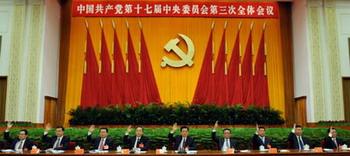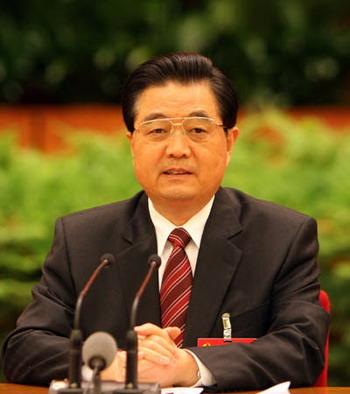China
CPC closes major meeting with decision on rural reform, development
Source: Xinhua | 10-13-2008 08:33
BEIJING, Oct. 12 (Xinhua) -- The Communist Party of China (CPC) Central Committee on Sunday approved a decision on major issues concerning rural reform and development at the close of a four-day plenum.
 |
| Photo taken on Oct. 12, 2008, shows all nine members of the Standing Committee of the Political Bureau of the Communist Party of China (CPC) Central Committee Hu Jintao (C), Wu Bangguo (4th R), Wen Jiabao (4th L), Jia Qinglin (3rd R), Li Changchun (3rd L), Xi Jinping (2nd R), Li Keqiang (2nd L), He Guoqiang (1st R) and Zhou Yongkang (1st L) attend the third Plenary Session of the 17th CPC Central Committee, which was held from Oct. 9 to 12 in Beijing.(Xinhua/Li Xueren) |
Hu Jintao, general secretary of the CPC Central Committee, delivered a work report at the Third Plenary Session of the 17th CPC Central Committee, which was held from Oct. 9 to 12 in Beijing.
 |
| Hu Jintao, general secretary of the Communist Party of China (CPC) Central Committee, delivers an important speech at the third Plenary Session of the 17th CPC Central Committee in Beijing, Oct. 12, 2008. The third Plenary Session of the 17th CPC Central Committee was held from Oct. 9 to 12 in Beijing.(Xinhua/Lan Hongguang) |
The country was facing challenges in its rural development and reform, but it would firmly push forward the work, said the communique issued after the plenum.
"Rural infrastructure is still weak and needs improving. Rural development is lagging behind and needs support. Farmers' income increases slowly and needs speeding up," said the document.
"We will firmly push forward the rural reform. We will continue to emancipate the mind," it said. "We shall work out new concepts and ideas to solve the problems in rural development."
The government would try to make a breakthrough in reforming the rural system, proceed in liberating the rural economy and improving its dynamics, create a better economic environment, improve rural development policy, it said.



